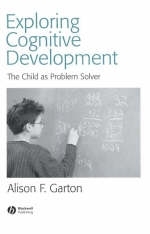
Exploring Cognitive Development
Wiley-Blackwell (Verlag)
978-0-631-23458-6 (ISBN)
This book uses the paradigm of the child as a problem solver to examine various theories of cognitive development.
Provides balanced coverage of a broad range of contemporary theories.
Focuses on collaborative tasks which are carried out with other children or adults.
Asks whether social interaction is the key to improvement in problem solving skills, or whether it is the skills and abilities that the child brings to the task that are paramount.
Draws on a wide range of research, including the author’s own research into dyadic problem solving.
Alison F. Garton is Professor of Psychology and Associate Dean at Edith Cowan University in Western Australia. She is the author of Learning to be Literate (Blackwell Publishing, Second Edition, 1998) and Social Interaction and the Development of Language and Cognition (1992), and the editor of Systems of Representation in Children (1993).
Preface vii
1: Introduction 1
Problem Solving 3
Social Explanations for Cognitive Change 6
Change in the Context of Interactive/Collaborative Problem Solving 9
Domain Specific Knowledge 10
Children’s Potential to Change 11
Theories of Mind 13
The Way Forward 14
2: Theoretical Overview 15
Piaget and Vygotsky: Is There Any Common Ground? 17
Peer Interaction: Various Perspectives 23
Implications for Piagetian and Vygotskian Theories 33
Research on Collaboration: Beyond Social Interaction 34
Sociocultural Theory 36
Dynamic Systems 41
Nature of the Problem to be Solved 42
How Else Can Problem Solving be Described and Explained? 43
3: Strategy Use and Learning in Problem Solving 44
Domains 45
Domains as Constraints on Cognitive Development 48
Innateness and Domain-specificity 49
Domains and the Social Environment 52
Strategy Choice 53
Learning New Strategies 66
4: Social Problem Solving 69
Peer Interaction and Problem Solving: A Theoretical Conundrum 70
Peer Interaction in the Classroom 77
Peer Interaction and Adult–Child Interaction 79
Theory of Mind and Problem Solving 80
Self-regulation in Problem Solving 84
Help Seeking in Problem Solving 87
The Role of Talk in Collaborative Problem Solving 89
Conclusion 94
5: What the Child Brings to the Task 96
Readiness to Benefit from Interaction 97
Cognitive Flexibility 97
Friendship and Sociability 106
Motivation to Collaborate 117
6: Summary, Review and implications 120
What and How Revisited 121
Difficulties Yet to Be Surmounted 124
Implications 126
References 129
Author Index 136
Subject Index 138
| Erscheint lt. Verlag | 24.2.2004 |
|---|---|
| Verlagsort | Hoboken |
| Sprache | englisch |
| Maße | 152 x 229 mm |
| Gewicht | 245 g |
| Themenwelt | Geisteswissenschaften ► Psychologie ► Allgemeine Psychologie |
| Geisteswissenschaften ► Psychologie ► Entwicklungspsychologie | |
| Geisteswissenschaften ► Psychologie ► Verhaltenstherapie | |
| ISBN-10 | 0-631-23458-6 / 0631234586 |
| ISBN-13 | 978-0-631-23458-6 / 9780631234586 |
| Zustand | Neuware |
| Haben Sie eine Frage zum Produkt? |
aus dem Bereich


